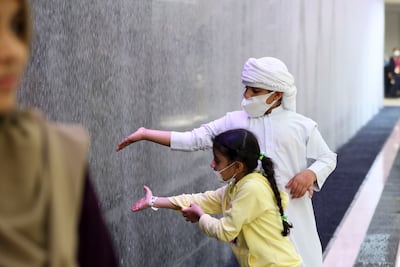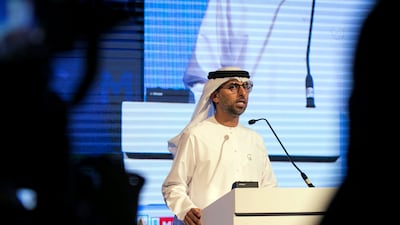The UAE is cutting its water consumption, building more efficient desalination plants and ending reliance on groundwater as part of its plans to conserve resources, a minister said.
Suhail Al Mazrouei, Minister of Energy and Infrastructure, said the UAE needed to recycle every drop of water because of its arid climate and limited rainfall.
Speaking to mark World Water Day at Expo 2020 Dubai on Tuesday, Mr Al Mazrouei said the UAE was ready to share its expertise on conservation with nations facing water scarcity.
Minister of Energy and Infrastructure
“No matter who you are and where you are – if you are an individual or company or government, you need to think of sustainability,” Mr Al Mazrouei said.
“Sustainability will make Planet Earth survive longer and will allow us all to live an easier life. We are privileged with the resources we have today. But we need to ensure that the next generation and the generations to come will also have something left.”
Several reports over the years have highlighted the pressure on the UAE's water reserves.
In 2019, the UAE was named as one of more than a dozen countries facing extreme pressure on its resources with groundwater reserves depleted though overuse.
Authorities in 2017 launched the Water Security Strategy 2036 to address the issue.
It set out how the UAE would reduce total demand on water resources by 21 per cent; increase the reuse of treated water to 95 per cent; reduce average consumption by each person by half, and develop a storage capacity for more than 45 days in extreme emergencies.

It has also run awareness campaigns for consumers and farmers among others to promote sustainable practices.
Mr Al Mazrouei said the country was well on track to achieving these goals.
“The strategy came out of necessity as we have limited rainfall in the UAE and we had to look at our resources to ensure access to clean, adequate and affordable water for years to come,” he said.
“For us living in this arid environment, we have to work harder,” he said.
The UAE relies on desalination – the process of converting seawater – for drinking water and regularly uses cloud seeding to encourage rainfall as it only receives about 100 millimetres a year.
Mr Al Mazrouei said the country was moving away from relying on groundwater and energy intensive methods of desalination – a process that removes salt from seawater.
The UAE also plans to build more reverse osmosis desalination plants. Reverse osmosis is a low energy way to purify water using membrane technology. Renewable energy systems are also being used in these plants, creating greater efficiencies.
Mr Al Mazrouei said the aim was to help and inspire other countries that face scarcity.
“We need to recycle every drop of water we have,” he said. “We need to change the way our children perceive consumption.
“They think water will be available forever, but water is a scarce resource.”
Separately, Mariam Al Mheiri, UAE Climate Change and Environment minister, said the country's "unsustainable water habits" were "placing great pressure on our finite water resources".
“Simple steps to cut down on water consumption can go a long way when taken collectively creating a kind of domino effect and slashing our community’s water use.”
"So we are really striving to manage the community’s water demand,” she said speaking at a separate event at the Expo on Tuesday.
The UAE meets 42 per cent of its drinking water needs through desalination, the minister said, and agriculture accounts for 60 per cent of the total fresh water consumption.
Safe drinking water, meanwhile, is recognised by the United Nations as a basic human right and the UAE is committed to ensuring access to vulnerable communities in developing nations.
The UAE Water Aid established by the Mohammed Bin Rashid Al Maktoum Global Initiatives foundation has funded more than 1,000 projects in 37 countries providing clean water to more than 13 million people.

















